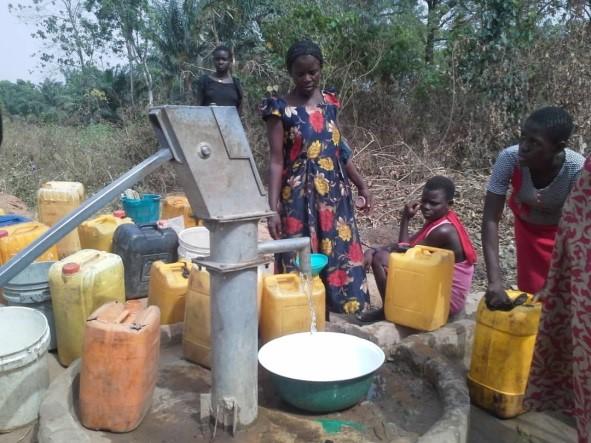[SUCCESS STORY] A voice for rural women of the South East
“Women, we are so marginalised,” says Ethel Atuokwu, member of Idikacho Women in Governance, a grassroots organisation mobilising women in south eastern Nigeria to become politically engaged. “At times women will have something to say but they don’t know how to say it because of ‘traditional’ rules that require them not to talk in public.”
“Because of this group - Idikacho Women in Governance,” Ethel says, “we now have the voice to speak about our views and give opinions, and even become members in decision-making in our communities. I love that.”
Women were once more engaged politically in the region. But their participation in politics and government has been declining, and they have not been able to unite to champion the cause of women’s leadership and participation in governance.
Both seen and heard
Frustrated with this situation, in 2013 Mercy Anagbogu, a professor and counsellor at the Nnamdi Azikiwe University, set up Idikacho Women in Governance in Anambra State. Idikacho’s aim was to get more women into decision-making positions and challenge the view that women should be “seen but not heard.” It would be a network of women who would share their experiences of advocating for change so that they could learn from each other and go out in their communities to address the issues of concern there.
With support from Voice to the People, a UK aid funded, governance project, Mercy was able to grow her small network, which then took on a life of its own. The women began to organise themselves around problems related to service delivery – whether the lack of clean water or inadequate schooling – and advocate for change with the government.
In one town in Anambra, for example, nurses working at a health centre were often harassed and even attacked. Ethel and other women from her local Idikacho chapter convinced the traditional ruler, the Igwe of Umuoji, to build a fence around the centre. At the same time, funds were released to build a surgery theatre and to renovate a well within the fenced off area.
From Anambra State to the rest of the region
But while effective in Anambra, until 2016 Idikacho remained local. That year, PERL identified Idikacho as an organisation that could be expanded, not only in Anambra but to the entire region.
Idikacho was exactly the type of organisation that the programme would support; it was ‘locally-led,’ addressed problems of public service delivery, and, of course, supported women. While there are many women’s groups in the South East, Idikacho was seen as unique because it focused on women having a larger societal influence through their involvement in politics and governance, and because the women themselves were leading the change and mentoring each other.
PERL wouldn’t provide Idikacho with funding but would find other ways to help Idikacho grow. The PERL team first decided to help bring the network to other states in the South East. Mercy and PERL identified women in the other four states – Abia, Ebonyi, Enugu and Imo – who had the interest and potential to bring Idikacho to their communities, normally women active in rural politics and the NGO community. PERL invited these ‘women champions’ to a meeting with the professor and the Anambra State Idikacho chapter. Participants discussed service delivery issues as well as how they had gone about trying to influence those in power. They were encouraged to replicate Idikacho in their communities.
While not all the ‘women champions’ then went on to spread the Idikacho philosophy, enough did to bring the model back home and to begin building their own Idikacho networks. One of the women who attended the PERL-organised meeting in December 2017 was Nancy Oko-Onya. Nancy brought Idikacho to Ebonyi State and is now the Idikacho State Coordinator.
“I realised that there is a need for us to work together and get our challenges addressed, get our needs met,” Nancy explains.
While only set up in 2018, the Ebonyi chapter is already making progress. In one community, for example, Idikacho women lobbied government representatives to get a primary school built. The resulting three-classroom solid construction replaced a thatched roof on wooden poles that had served as a classroom. The school also came with a water borehole, reducing the time women and children had to walk to fetch water as well as the incidence of water-borne disease.

Currently, across the five states of the South East, there are about 6500 Idikacho members. PERL now supports the entire network. The bulk of this consists of bringing the women together for meetings where they can learn from each other, and where they receive training on leadership, public speaking, effective political participation, the generation of evidence for advocacy and the monitoring of election promises. The participants develop short-term work plans – outlining who they are to speak to, when, using which arguments - and discuss how they will overcome likely obstacles.
Idikacho has expanded because of its effectiveness, but also because of the personal impact it is having on women – an impact that won’t disintegrate once PERL is out of the picture. Members are motivated to keep working because they see what other women are able to accomplish. Many of them undergo personal transformations themselves, and this, in turn, inspires other women still.
As Ethel says, “Working with Idikacho makes the women to stand firm.”
To learn more about PERL’s work with Idikacho, read the full story.